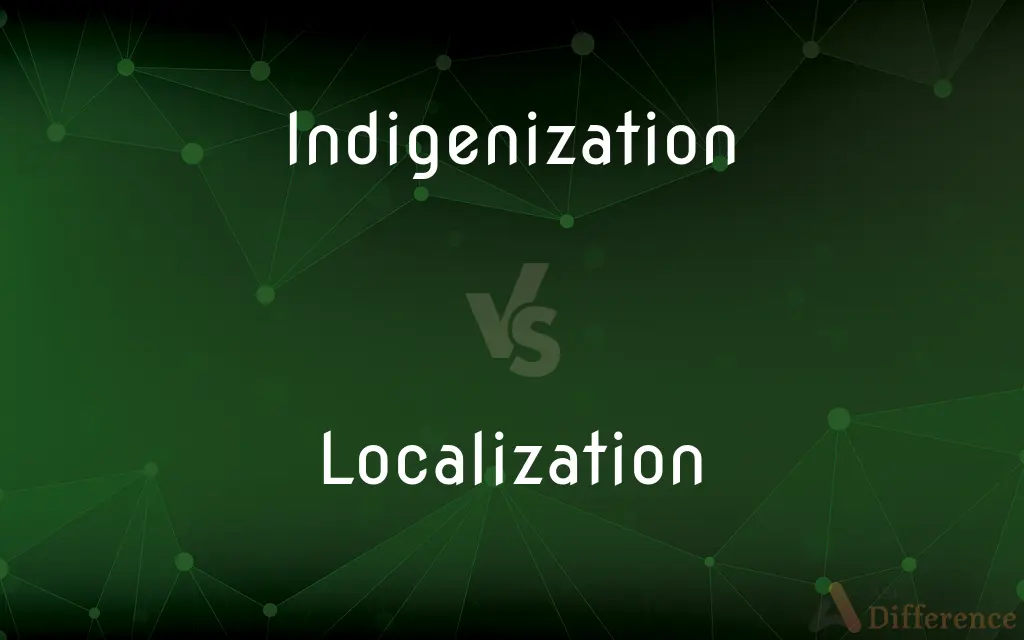Indigenization vs. Localization — What's the Difference?
By Urooj Arif & Maham Liaqat — Updated on April 3, 2024
Indigenization adapts products or content to align with local cultures and languages, emphasizing cultural integration, whereas localization focuses on adapting products for local markets, prioritizing market-specific requirements.

Difference Between Indigenization and Localization
Table of Contents
ADVERTISEMENT
Key Differences
Indigenization is a process that goes beyond surface-level changes, seeking to deeply integrate products, services, or content into the local cultural fabric. It involves understanding and respecting local traditions, values, and norms to create offerings that feel inherently local. On the other hand, localization is primarily concerned with ensuring that a product or service meets the functional and linguistic needs of a specific market. It focuses on translation, regulatory requirements, and local consumer preferences to make a product accessible and appealing to local users.
While indigenization often requires extensive research into local cultures, histories, and societal norms to authentically integrate an offering into a community, localization might involve a more straightforward approach of adjusting content, language, and design to meet local expectations without necessarily embedding deep cultural elements. For instance, indigenization might involve creating a product from the ground up with local communities, whereas localization could entail modifying an existing product to fit local markets.
Indigenization emphasizes collaboration with local communities and stakeholders to ensure that the adaptation respects and reflects indigenous knowledge and practices. This approach can enhance social relevance and acceptance. Localization, while it may involve stakeholder input, often focuses more on technical and linguistic adjustments rather than deep cultural immersion.
The goal of indigenization is to foster a sense of ownership and identity among local populations, making the adapted product or content an integral part of the local culture. Conversely, the primary objective of localization is to increase market penetration and consumer satisfaction by ensuring that a product or service is usable and understandable in a new market.
While both processes aim to make products or services more relevant to new audiences, indigenization seeks to create a deeper cultural connection and long-term social impact, while localization aims at immediate market fit and consumer usability.
ADVERTISEMENT
Comparison Chart
Focus
Cultural integration, deep adaptation
Market adaptation, surface-level changes
Objective
Cultural relevance and integration
Market penetration, consumer satisfaction
Approach
Collaborative, involves understanding local culture
Technical and linguistic adjustments
Key Activities
Research into local culture, collaboration with locals
Translation, regulatory adjustments, design changes
Outcome
Deep cultural connection, social impact
Market fit, usability, immediate consumer appeal
Compare with Definitions
Indigenization
The process of making something reflect local culture and practices.
The university's indigenization efforts included incorporating indigenous knowledge into its curriculum.
Localization
Adapting a product or content to meet the requirements of a specific market.
The app's localization included translating the interface into five different languages.
Indigenization
Adapting foreign concepts or products to align with indigenous values.
The software was indigenized to include local languages and cultural references.
Localization
Tailoring marketing strategies to align with local consumer preferences.
The brand's localization strategy involved creating region-specific advertisements.
Indigenization
Incorporating indigenous peoples' needs and contributions into national policies.
Policy indigenization is crucial for inclusive governance.
Localization
Modifying software to support different languages and cultural norms.
Localization efforts ensured the software was fully functional in Japan.
Indigenization
Customizing educational content to reflect the local culture.
The indigenization of school textbooks made history lessons more relevant to local students.
Localization
Adjusting educational content to meet local standards and languages.
Localization of the online course content made it accessible to a broader audience.
Indigenization
Integrating indigenous methods and perspectives into broader practices.
Indigenization of the healthcare system led to the inclusion of traditional healing practices.
Localization
Customizing products to adhere to local regulations and standards.
The medical device's localization was essential for its approval in European markets.
Indigenization
Indigenization is the act of making something more native; transformation of some service, idea, etc. to suit a local culture, especially through the use of more indigenous people in public administration, employment, etc.The term is primarily used by anthropologists to describe what happens when locals take something from the outside and make it their own (e.g.
Localization
To make local
Decentralize and localize political authority.
Indigenization
The act of making something more native; transformation of some service, idea etc. to suit a local culture, especially through the use of more indigenous people in administration, employment etc.
Localization
To confine or restrict to a particular locality
Localized the infection.
Indigenization
The capability to manufacture a product, or supply a service independently within a country instead of relying on foreign manufactures or suppliers.
Localization
To attribute to a particular locality
Sought to localize the origin of the rumor.
Localization
To become local, especially to become fixed in one area or part.
Localization
The act of localizing.
Localization
(software engineering) The act, process, or result of making a product suitable for use in a particular country or region.
Localization
The act, process, or result of adapting translated text to fit a local culture; domestication.
Localization
The state of being localized.
Localization
(algebra) A systematic method of adding multiplicative inverses to a ring.
Localization
(algebra) A ring of fractions of a given ring, such that the complement of the set of allowed denominators is an ideal.
Localization
Act of localizing, or state of being localized.
Localization
A determination of the location of something;
He got a good fix on the target
Localization
(physiology) the principle that specific functions have relatively circumscribed locations in some particular part or organ of the body
Common Curiosities
Can a product be both localized and indigenized?
Yes, a product can undergo both processes to ensure it is both market-ready and deeply integrated into the local culture.
How does localization differ from indigenization in objective?
Localization aims to adapt products for specific markets to ensure usability and market penetration, whereas indigenization aims for deep cultural integration.
What is the main goal of indigenization?
The main goal is to deeply integrate products or content into the local cultural fabric, enhancing cultural relevance and integration.
Why is localization important for global businesses?
It helps businesses cater to local markets effectively, ensuring products are accessible, usable, and in compliance with local regulations.
How do companies determine when to localize or indigenize a product?
Decisions are based on the target market's cultural characteristics, consumer preferences, and the depth of cultural connection desired.
Does indigenization involve changing the core features of a product?
It may involve altering core features to align with local cultural practices and values, making the product resonate deeply with the local community.
Can localization affect a product's brand identity?
Yes, by adapting to local markets, a brand may evolve its identity to be more inclusive and appealing to a wider range of consumers.
How does indigenization benefit local communities?
It fosters a sense of ownership, respects local cultures, and can lead to socially relevant and accepted products or services.
Is indigenization more complex than localization?
Yes, indigenization can be more complex as it requires a deep understanding of and integration with local culture, beyond just language and market preferences.
How do localization and indigenization impact product development?
Both processes can influence product design, development priorities, and marketing strategies to better meet the needs of targeted or broader audiences.
What challenges do companies face in indigenization?
Challenges include understanding deep cultural nuances, collaborating with local communities, and ensuring genuine integration without cultural appropriation.
What role does technology play in localization?
Technology facilitates translation, adaptation to local requirements, and helps tailor products to meet specific market demands efficiently.
Can indigenization lead to innovation?
Yes, integrating indigenous knowledge and practices can spur innovation by introducing unique perspectives and solutions.
Is localization only about translating content into different languages?
Translation is a significant part, but it also includes adapting to local customs, regulatory requirements, and consumer habits.
Why might a business choose not to indigenize a product?
Constraints may include the cost, complexity, or a strategic focus on broader market appeal rather than deep cultural integration.
Share Your Discovery

Previous Comparison
Affect vs. Mood
Next Comparison
Expository vs. NarrativeAuthor Spotlight
Written by
Urooj ArifUrooj is a skilled content writer at Ask Difference, known for her exceptional ability to simplify complex topics into engaging and informative content. With a passion for research and a flair for clear, concise writing, she consistently delivers articles that resonate with our diverse audience.
Co-written by
Maham Liaqat















































